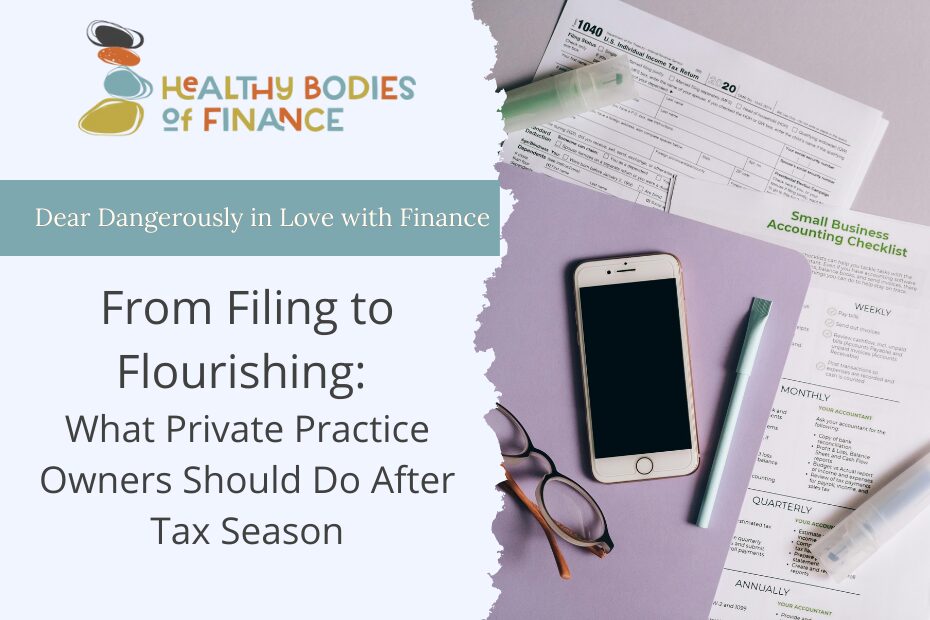You filed your taxes. You breathed that first sigh of relief. But now there’s a new question creeping in: Now what? If you’re feeling unsure about what financial steps to take next for your therapy practice, you’re exactly where you’re supposed to be. Let’s talk about how you turn this moment into momentum.

Dear Dangerously in Love with Finance,
We just filed our business taxes for our private therapy practice — it’s our first year operating as an S-Corporation! I honestly thought I’d feel this huge sense of accomplishment… but instead, I feel strangely lost.
We worked so hard last year — helping clients heal, growing our team, bringing in more revenue — and then spent what felt like forever gathering all the financial documents for our accountant. We celebrated submitting our taxes… but now that it’s over, I keep thinking: “What now?”
Is there anything else we should be doing financially after filing? Are there steps we’re supposed to take to set ourselves up for this new year, or do we just go back to business as usual? I don’t want to slip into bad habits or miss important opportunities to grow stronger. Honestly, I’m also scared because even though our practice is helping so many people, I feel like I’m just winging it with the financial side.
Any advice would mean the world right now.
Sincerely,
Feeling Accomplished… but a Little Adrift
Dear Feeling Accomplished… but a Little Adrift,
First of all — breathe. Filing your first S-Corporation tax return is no small feat, especially while running a heart-driven private practice that changes lives. Let’s take a moment to honor that: You showed up. You faced the financial side. You completed a major milestone.
Now, about that strange, unsettled feeling you have? It’s not only normal — it’s wise. It means you’re aware that real financial management for therapy practices isn’t just about surviving tax season. It’s about building momentum right after it.
You’re absolutely right to ask, “Now what?” — because this is actually the perfect time to step into a new season of financial clarity, strength, and intention. Here’s what I recommend you focus on next:
1. Schedule a Post-Tax Debrief Meeting
Don’t let the tax return just sit there like a closed book.
Ask your accountant for a post-filing debrief (even if they didn’t offer one). Go over:
This is the time to learn from the past — not judge yourself. Knowledge fuels better financial leadership for health and wellness providers like you.
2. Review Your Financial Systems and Bookkeeping
Ask yourself, “Was getting ready for taxes smooth… or pure chaos?”
If it felt chaotic, that’s a major signal that your bookkeeping for therapists needs serious love. Smooth, organized bookkeeping means you’ll always know:
If you don’t already have monthly financial systems in place, now is the perfect time to either set up software like QuickBooks or outsource to a professional who specializes in accounting for private therapy practices.
The goal?
No more scrambling next year. Financial freedom starts with peace, not panic.
3. Create or Update Your Financial Plan for the Year
Now that you see how last year played out, you can be proactive — not just reactive.
Sketch out a financial forecast for the next 12 months:
This is the heartbeat of smart financial management for therapy practices: not working harder, but working smarter with your numbers.
4. Start Saving for This Year’s Taxes Immediately
Please, please don’t wait until next spring to start thinking about taxes again.
Open a separate savings account and treat your tax money like it was never yours to spend. Every month, transfer a set percentage (usually 25–30% of your net profit after salary) into that account.
Imagine next tax season — not feeling dread, but feeling calm because it’s already handled.
This is real, everyday financial leadership for private practice owners.
5. Celebrate and Reflect
I know you want practical steps (and you’re getting them!) — but don’t skip the emotional side.
Sit down with a journal, or even your team if you have one, and answer:
Businesses don’t grow just because they hustle. They grow when their owners reflect, adjust, and lead with intention.
6. Consider Building Your Financial Dream Team
If managing all the financial pieces yourself felt heavy, it’s okay. Growth often means asking for help sooner, not later.
Consider bringing in support like:
Outsourced financial services for private practice owners aren’t a luxury — they’re a necessity for sustainability and long-term peace of mind.
Lots of Love, Coffee and Chocolate,
Dangerously in Love with Finance and the HBoF Family
🍃 Mindful Thoughts
Here’s the heart of it, my dear therapist:
You didn’t become an S-Corp just to file taxes once a year.
You became an S-Corp because you’re building a future — a business that provides healing for others and financial wellness for yourself.
Filing taxes was just one hill. Now you’re climbing a mountain — one that leads to financial independence, personal freedom, and an even deeper ability to serve.
You have already taken brave steps that most business owners never do.
Keep going. Keep leading. Keep learning.
You are not lost.
You are becoming.
📣 Call to Action:
You didn’t come this far just to stay overwhelmed.
You built your therapy practice with heart, purpose, and a vision for something bigger — not to spend your nights worrying about cash flow, taxes, or financial planning.
If you’re ready to move beyond “just getting through tax season” and start leading your private practice with confidence, I invite you to take the next step.
Let’s talk about where you are now — and where you’re ready to grow.
Click below to schedule your discovery call. Find a date and time that feels good for you — I’ll be ready to meet you there.
👉 https://letsmeet.io/healthybodiesoffinance/30-min-free-consultation
Pick a date and time highlighted in blue!

Fall dangerously in love with your finances. Your future deserves nothing less.
3 Job Benefits Your Small Business Can Offer As You Hire a Speech Therapist
Dear Dangerously in Love with Your Finances, I am a speech therapist in private practice located in …
Why Transparent Communication Is the Secret to Growing a Successful Med Spa Team
Dear Dangerously in Love with Finance, I own a med spa in Phoenix. We started in 2019 with one treat…
This article is designed to provide information only and should not be considered legal or tax advice. Because of the complexity of the law and the variables in your own personal tax and accounting situation, you can’t rely on our advice specifically related to your unique circumstances. In order to get the best tax savings and legal advice available to you, you should consult with your own accountant, attorney or advisor regarding your particular facts and circumstances. Healthy Bodies of Finance is an accounting firm that specializes in working with health and wellness providers. We provide monthly accounting & bookkeeping services and financial education. For more information on our specialized services for health and wellness providers please contact us at info@healthybodiesoffinance.com


